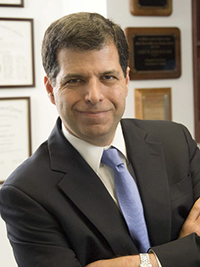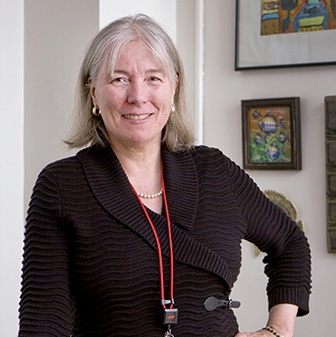Engaging with the Community

Gary K. Schwartz, MD, Interim Director, Herbert Irving Comprehensive Cancer Center, and principal investigator of MU-NCORP
Improving Access to Cancer Care Locally
As a member of the National Cancer Institute’s Minority and Underserved Community Oncology Research Program (MU-NCORP),
Columbia has long been committed to improving healthcare access for area residents. The Washington Heights neighborhood is 71 percent Hispanic and 14 percent black, with nearly one-third living below the poverty level. Cancer is the leading cause of reduced lifespan for members of this community.
The MU-NCORP program helps to accelerate enrollment in clinical trials, allows for testing of promising new interventions in various care delivery systems, and increases the relevance of study findings. Engaging community practices and healthcare providers in collaborative research also can facilitate the application of effective, evidence-based practices to improve the quality of care and health outcomes and reduce cancer health disparities.
“ We are studying more effective ways to deliver treatments to minority populations, making sure they receive the very best our medical system has to offer.”
— Gary K. Schwartz, MD
The program enables patients to take advantage of the latest clinical trials and advanced cancer treatments while staying close to family, friends, support systems, local physicians, and health organizations. Patients also benefit from internationally known physicians at Columbia’s Herbert Irving Comprehensive Cancer Center, one of 49 NCI-designated Comprehensive Cancer Centers in the country, and the combined expertise of a national network of cancer researchers throughout the country.
The Columbia program also works closely with the Community and Ambulatory Research and Enrollment (CARE) Shared Resource, created to ensure that cancer research at the Herbert Irving Comprehensive Cancer Center represents the entire community. CARE provides dedicated recruitment and community education, as well as additional services throughout the continuum of cancer prevention (including etiology, screening, and survivorship). These services enhance the quality and effectiveness of cancer prevention research conducted at Columbia by helping to ensure diversity in study participation.
In addition, the Columbia’s Herbert Irving Comprehensive Cancer Center, in collaboration with the Mailman School of Public Health, has instituted a number of outreach efforts focused on primary and secondary cancer prevention, as well as recruitment for therapeutic trials. These programs are helping to inform NewYork-Presbyterian’s communities of evidence-based guidelines for primary prevention, such as the importance of the human papilloma vaccination and smoking cessation programs, and secondary prevention, including colonoscopy and mammography screenings.
“ Our goal is to reduce any major disparities within our communities for primary, secondary, and tertiary cancer prevention.”
— Mary Beth Terry, PhD, cancer epidemiologist Columbia University
To understand disease patterns and reduce cancer health disparities, Columbia epidemiologists monitor incidence and mortality trends within the Hospital’s catchment areas through Department of Health citywide and state-based data. They are interested in conducting cancer research that is particularly relevant to specific communities that have a high prevalence of various cancers. As one example, Columbia researchers have been investigating air pollution and its influence on lung and breast cancer rates.
Supported by the NCI and in partnership with Columbia’s Community and Ambulatory Research and Enrollment program, physicians and staff play an active role in community events and with local medical practices in educating residents about the benefits of participating in clinical trials.

Monika M. Safford, MD, Co-Director, Cornell Center for Health Equity, Weill Cornell Medicine
In 2018, researchers at Weill Cornell Medicine and Cornell University’s Ithaca campus established the Cornell Center for Health Equity to better understand why health outcomes vary among demographic groups and to use this information to eliminate health disparities. Working with local organizations and providers, the Center is studying the causes of health disparities, including unequal healthcare access and quality, as well as social influences among minority communities. Investigators will use their findings to develop new interventions designed to overcome barriers to improve adverse health outcomes caused by these differences. They will also train the next generation of researchers who can tackle this critical public health issue.
The Center’s faculty members are addressing disparities in cancer, heart disease, and stroke, and outcomes in communities with a disproportionate burden of disease in New York City, as well as in more rural regions of Central New York. Working collaboratively with colleagues at NewYork-Presbyterian Brooklyn Methodist Hospital and NewYork-Presbyterian Queens, Center investigators are developing improved approaches to community-based cancer prevention and control. In Brooklyn, these efforts include developing a network of community-based health educators in four neighborhoods where the rates of breast, lung, and prostate cancer are the highest in the borough. In another project, Center investigators are implementing a mammography screening program for women residing in neighborhoods where at least 25 percent of residents live below the federal poverty line. In collaboration with the New York State Department of Health, the program’s bilingual patient navigator has conducted outreach and screened hundreds of minority women for breast cancer to date.



